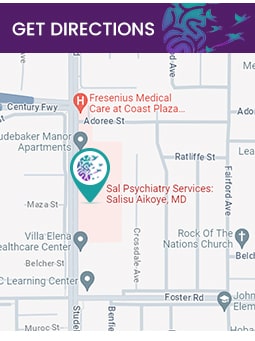PTSD Treatment Specialist in Norwalk, CA
PTSD is a condition in which a person has trouble recovering after dealing with a terrifying incident. The disorder may last for some time, with triggers bringing back memories of the trauma and causing extreme emotional and physical responses, anxiety, or depression. Visit our board-certified professional, Dr. Salisu Aikoye, MD, for PTSD therapy at Sal Psychiatry Services. For more information, contact us today or book an appointment online. We are conveniently located at 13132 Studebaker Rd, Suite 10, Norwalk, CA 90650.



Additional Services You May Need

Additional Services You May Need
▸Medication Management
▸Psychiatry Consultation
▸Marriage Counseling
▸Psychotherapy
▸Spravato
▸ADHD
▸Anxiety Disorders
▸Bipolar Disorder
▸Depression
▸Mood Disorders
▸TMS
▸Talk Therapy
▸Telehealth
▸EsKetamine
▸Wellness
▸Schizophrenia
▸Mindfulness
▸Addiction
▸Support Therapy
▸OCD
▸PTSD
▸Substance Abuse



